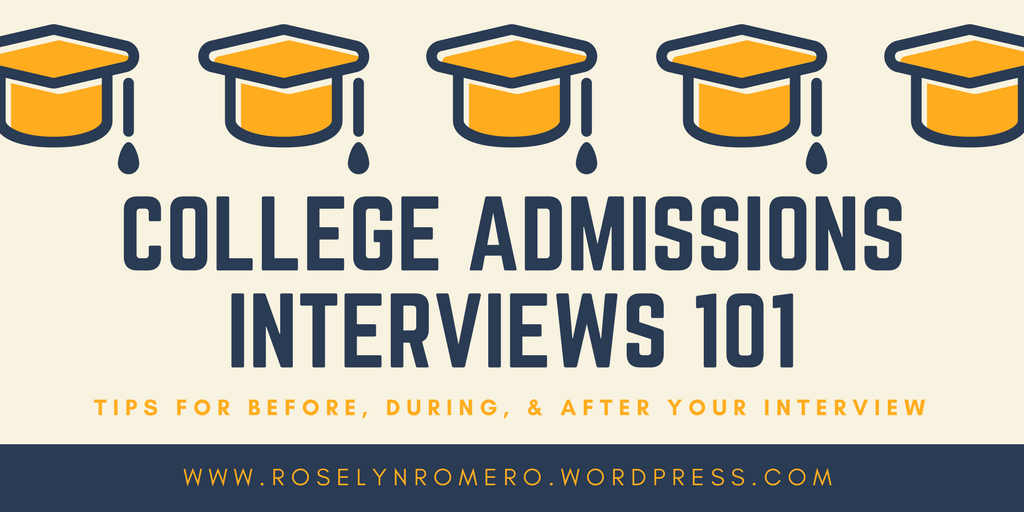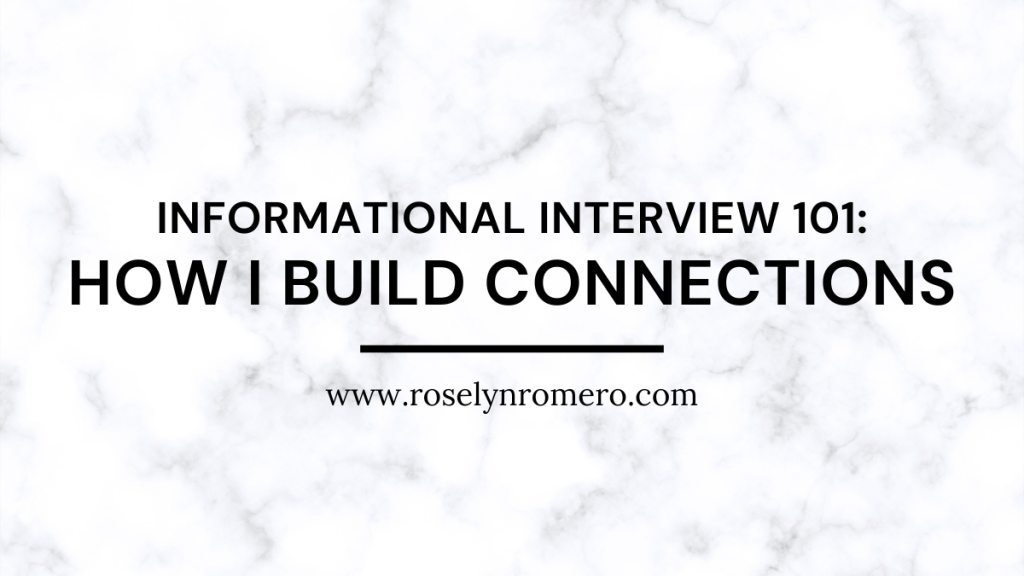On the afternoon of Tuesday, August 22, 2017, I had the amazing honor to be interviewed by one of the faculty members employed at the Office of Admission at the University of Southern California (USC). I definitely felt nervous prior to the interview (who wouldn’t?), especially because USC is at the tippy-top of my college list this year and I wanted to make a positive impression on the person interviewing me.
Whether you are an incoming freshman or senior, I want to give all of you some helpful pieces of advice – as well as a general timeline – that I utilized before, during, and after my admissions interview!
I have split this post into 3 distinct parts (Before, During, and After Your Interview) in order to make your navigation through this post much easier.
Before Your Interview
- Hop onto the school’s admissions website and schedule an interview (if applicable).
Some schools offer their prospective students the opportunity to schedule an interview with either an admissions counselor of their school or at a specific college they would like to attend within the university (i.e. Arthur L. Carter Institute within New York University). Fortunately USC offers interviews that prospective students can schedule themselves via an online application, so I would definitely take full advantage of this resource in order to help you stand out as an applicant when applying to a specific university!
Unfortunately, however, many schools do not offer this option, and instead contact an applicant personally if they are having trouble deciding on admitting him/her or not. Do not be discouraged if this describes one of your top schools – you can always demonstrate your interest in the school through many other ways, such as signing up for their email newsletter or scheduling a campus tour! - Write down the date, time, and location of your interview.
Make sure you remember the day of your interview, as well as where it will be held! What helped me out was using the Calendar app on my phone to mark the date of my interview and to set up several reminders leading up to the day of.
Another vital piece of information that not many people do is to print out any emails you or your parents receive confirming the date and time of your campus tour. I recommend printing out at least 2 copies of the email(s) and bringing them with you to your interview. This way, if the college has any issues finding your name in their database, they will see that you received emails from the school to confirm your registration. - Research the living heck out of the college.
I say this with the utmost sincerity possible. Head on over to the college’s website again, use headphones to drown out the noises of the outside world, and spend at least 1 hour researching every single aspect of the school. Take notes on these five main topics:
• Academics (courses you’d like to take, courses you think would challenge you, courses that sound remotely interesting, etc.)
• Extracurricular activities (any clubs or sports you’d like to get involved in, any clubs that have yet to be created that you would love to start, etc.)
• Campus qualities (where the campus is located, student-to-faculty ratio, the diversity of the student body, typical weather, etc.)
• Student life (what sororities/fraternities you’d like to join, whether most students commute or live on campus, any restaurants or recreational centers on campus that students frequently go to, etc.)
• Career opportunities (what internships are available to students, whether or not the school hosts a career fair, work-study programs on campus, what percentage of students land a job within 6 months of graduation, etc.) - Compile a list of questions you would like to ask your interviewer.
It’s important to demonstrate your interest in the school by asking your interviewer questions rather than ending the interview by saying, “I don’t have any other additional comments or questions.” While you’re researching the college or university, be sure to write down any specific questions that aren’t apparent on the school’s website.
For example, I asked my interviewer, “What is one thing you would fight to keep unchanged at USC?” This was my way of seeing what someone who has worked at USC loves the most about the campus, as well as what makes USC so special from other universities. - Take notes on highlights from your high school career.
By “highlights,” I mean any clubs or organizations in which you have shown commitment (and hopefully leadership), as well as any AP/IB courses that have made a lasting impression on you.
Two questions I received during my interview was what AP courses I enjoyed the most and which ones I found particularly challenging. If your interviewer pulls the same questions on you, be prepared to answer with at least 2 AP/IB courses that have challenged you or helped you grow as a student through the rigorous coursework. Personally I selected AP English Language and Composition for my enjoyable class and AP Biology as my “difficult” one, but it may be two completely different courses for you!
Another question I received was which extracurricular activities were I involved in throughout high school. To avoid a particularly drawn out response, list at least 2 activities that mean the most to you and a specific instance in each club in which you demonstrated your leadership skills. For instance, I chose to discuss my experience in Key Club and newspaper class, which are two activities that have shaped me immensely as a person throughout the last 3 years of high school. Again, your activities may be completely different from mine. Simply choose the ones that are the most significant to you!
It also helps to create a school activities résumé, which differs from a standard résumé as a school activities résumé outlines all the activities you have done outside of the classroom and all courses you have taken in your high school career. Some schools may call this a “brag sheet,” so if your high school offers templates for this, take advantage of this resource! (I promise to do another blog post in the future about how to properly fill out a school activities résumé!) - Research and practice common interview questions.
Ask a family member or someone you can trust to help you out with this step. Have them ask you common questions that you’d normally ask within an interview (i.e. “Tell me about yourself” and “Why do you want to attend this college?”). Take turns asking one another questions so you can truly understand the feel of an interview.
Another super useful tip that I’d like to squeeze in here is to practice answering out-of-the-blue questions. The only question that completely stumped me during my interview was, “If you were to choose any living person to teach a course at USC, who would that person be and what course would he/she teach?” Luckily I was able to come up with an answer right away, but questions like those are used by the admissions officers to determine whether you can think quickly on your feet and who you truly are as a person.
I’m not saying you will receive the exact same questions as I did, but practice asking and answering oddball questions! They will undoubtedly keep your adrenaline running, but they will help immensely with your improvisation skills. - Get directions to the location of your interview.
The night before my interview, I looked up the location of my interview and accidentally wrote down the incorrect address on my phone! This is why it’s extremely important to research directions to the location of your interview, whether it be through calling the school for information, asking faculty members or students at the school for assistance, or even double-checking your emails for any source of information. - Lay out all the clothes you will be wearing for your interview.
In addition to researching the location of my interview, I also organized all the clothes I would be wearing to my interview the night before. This was super helpful as I was able to wake up without stressing too much about putting together an outfit on the morning of!
If you’re ever confused about what to wear to a college admissions interview, think business-casual. You want to dress professionally (as if you were going to church), but not appear too overdone (as if you were going to prom).
For instance, I wore golden hoop earrings, a light turquoise blouse with pearls along the neckline, a beige cardigan (because my blouse was sleeveless), a black skirt that reached my knees, and comfortable wedges that would last me the entire day. You can definitely dress like you would at a Mock Trial competition (for ladies, that means sporting a white button-up and black skirt), but be sure everything you wear is modest and comfy! You don’t want to be pulling down your skirt when you first meet your interviewer – that doesn’t look professional, nor does it make an outstanding first impression.
For men, dress the way you would at a semi-formal or formal event. This means a crisp dress shirt, a nice tie, black slacks, black dress shoes (with black socks to match!), and neatly combed hair.
For those who love using makeup, I would suggest going for a natural makeup look – nothing too dramatic, nor colorful. I followed my basic foundation routine, but for the eyeshadow, I merely applied bronzer on the crease of my lids to add subtle depth to the eyes. As for the lips, I went for a pink shade (more specifically, Kat Von D’s liquid lipstick in the shade “Lolita”) that closely matched the color of my natural lips.
However, if you’re applying to a more “artsy” college, then feel free to go crazy with the eyeshadow! Be creative by showing off your favorite makeup look, whether it be a sultry smokey eye or a classic bright red lip. - Be sure to arrive on campus at least 30 minutes prior to the scheduled time of your interview.
Although my interview was set for 2:00 PM, I actually arrived at USC at around 10:30 AM for a campus tour at 11:00 AM, so I certainly had enough time to think about what I was going to say prior to my interview. However, I checked in to the USC Admission Center (which is the official location for on-campus interviews) about 15 minutes before the time of my interview in order to give myself plenty of time to ease my nerves, use the restroom, and go over any notes I may have taken about the school.
Arriving early ensures that you will have sufficient time to find the location of your interview if you get lost (like what happened to my dad and me). Additionally, this allows you to roam about the campus for a while to look around the buildings and obtain a true sense of the campus’s vibe. Plus, punctuality is very important to your interviewer as this shows professionalism and eagerness to speak with him/her.
During Your Interview
- Introduce yourself in a warm and genuine manner.
As soon as your name is called by your interviewer, stand up, give him/her a firm handshake, and greet him/her in an enthusiastic tone! Be sure not to sound too fake, though – you don’t want your interviewer to think you rehearsed every single part of your interview. - Use eye contact.
Eye contact shows that you sincerely care about what your interviewer has to say and that you are listening to his/her every word. However, only use eye contact when it is appropriate. You don’t want to be staring creepily at your interviewer. - Think of it as merely a conversation, not an interview.
Remember that these interviews should never follow a script. You should be able to speak with your interviewer as if you were talking with an adult you trust. These interviews are meant to be conversational and should make you feel at ease. Avoid sounding “robotic” in your responses – this will only make your entire interview uncomfortable for both of you. - Avoid showing that you are nervous.
If you’re extremely nervous about your interview, don’t show it! This will only show your interviewer that you are not comfortable speaking with him/her rather than assuring your interviewer that you are relaxed and content.
Try taking a few deep breaths prior to your interview. Do not fidget, squirm, bite your nails, or any other habits you tend to do when you’re feeling tense. - Use hand gestures.
By moving your hands, your interviewer will see you as a much more convivial, lively person! Only use your hands with purpose, though – you don’t want to appear as though you’re speaking sign language to him/her throughout the entire interview. Instead, use hand gestures to highlight any important points during your responses.
- Keep your answers concise.
You don’t want to bore your interviewer with a lengthy anecdote about how you spent your first all-nighter during finals week. Keep your responses detailed without being too drawn out. If you notice your interviewer attempting to cut you off during your responses, it’s probably a sign that you need to shorten your answers!
In addition, stay on topic as much as possible. It’s very simple to go off on tangents – especially if the question is super vague – but your interviewer would definitely appreciate it if you answer the question directly instead of beating around the bush. - Remember to ask plenty of questions to your interviewer!
Again, asking questions will show your genuine interest in attending the school, as well as give you the chance to learn more about the college from someone who is well-versed in the school! Ask questions about your specific field of study, what their favorite factor about the college or university is, and any other extracurricular activities or job opportunities that you would love to get involved in, should you get admitted to the school. - Ask your interviewer for his/her contact information.
Pro-tip: ask your interviewer for his/her business card if it hasn’t been offered to you already! Use your interviewer’s contact information as a resource to not only thank him/her for interviewing you, but to also ask about any further questions you may have pertaining to the admission process.
If he/she does not have any business cards for you to take home, politely ask your interviewer to write down his/her telephone number, email address, and address on a piece of paper for you instead. - Give your interviewer a final handshake before you depart.
Right before you leave the location of your interview, be sure to thank your interviewer and give him/her one last handshake to establish a long-lasting, positive impression.
After Your Interview
- Use your interviewer’s contact information that you obtained to thank him/her for interviewing you.
I recommend sending a physical thank-you card via mail to your interviewer. If this is not feasible, however, shoot your interviewer a thank-you email for taking the time out of his/her day to speak with you in person.
By thanking your interviewer, you will perpetuate the positive impression he/she has of you, making it much easier to remember your face amongst a pool of a thousand students that he/she may interview annually.
You don’t have to make your thank-you note very lengthy – merely thank your interviewer for his/her time, as well as a statement that says you will contact him/her again in the future in case you have any other questions about the university. - Write notes about how the interview went.
Whether your interview experience went fairly smoothly or downright awfully, be sure to write it down and document everything! This will give you a chance to review your time at each school for future reference, and may help you make the final decision when selecting the university you will eventually attend. - No matter how the interview went, be proud of yourself!
Even if your interview went poorly, it is still important to give yourself some credit. You went through hours of practice questions, research, and the actual daunting interview process, which are all experiences that many students don’t voluntarily endure. Pat yourself on the back and treat yourself after the interview! You are an amazing student, regardless of the outcome of your interview.
If you have a college admissions interview approaching in the near future, I wish you all the luck in the world! Feel free to use these tips, or even create some more for yourself and share them with me! I’d love to hear any other pieces of advice you may have.
As always, I will write again soon. ♡
Love, Roselyn




Leave a comment